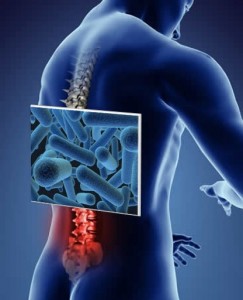Is an Infection Degnerated Disc Causing Your Low Back Pain?
Could a infection degenerated disc be causing your aching back? I came across a really interesting research article a few weeks ago. Every now and then one of these jumps out as a possible game changer for what we do with our patients. I came across the article again today, so it’s time to blog on it. The research study purported to find that bacteria may cause as many as half of all discs to degenerate.
The study authors took samples of disc tissue being removed during surgery for a disc herniation and sent these for culture. They claim to have followed stringent aseptic technique to avoid the samples becoming contaminated in the operating room. Surprisingly, of the 61 middle aged patients, 46% had bacteria grow out of their disc samples. None of the patients had prior surgery or spinal injections. Of the discs infected with bacteria that loved low oxygen conditions (anaerobic), 80% developed Modic changes (swelling in the vertebrae bones around the disc) at an adjacent level whereas none of patients with oxygen loving bacteria (aerobic) and 44% of the uninfected disc patients developed this same MRI finding. Is this an isolated research finding from a lone paper, perhaps caused by the sampling technique? Well a National Library of Medicine search turned up some interesting results. Turns out a 2012 paper found very similar things. In this paper, the study authors looked at 83 patients undergoing a disc replacement surgery and found infections in 40/83 (48%). Unlike the first study, Modic changes weren’t associated with the infected discs and about half of the patients had a pre-operative discogram, which could have seeded the infection. However, there was no more infection in the patients who had a discogram versus the patients who didn’t have one. Looks like all of this was theorized in a 2008 paper that postulated that the new blood vessels surrounding herniated or degenerated discs could bring in a low level bacterial infection in select patients. If all of this isn’t interesting enough, consider that still yet another research paper has found the Herpes Virus in 81% of 16 patients with degenerated discs.
Is there a simple way to tell if you have an infection degenerated disc without having to undergo low back surgery? Maybe. A 2011 study out of Japan investigated Diffusion Weighted Imaging (DWI) MRI and was successfully able to identify 100% of the infected disc cases and exclude all of the non-infected disc cases (100% accuracy) in a small group of about 30 total patients.
The upshot? With two papers showing that bacterial infection could be the cause of about half of all degenerated discs and a simple and reasonably reliable way using specialized MRI imaging to tell an infected disc from a clean one, it may be worth screening some patients.

If you have questions or comments about this blog post, please email us at [email protected]
NOTE: This blog post provides general information to help the reader better understand regenerative medicine, musculoskeletal health, and related subjects. All content provided in this blog, website, or any linked materials, including text, graphics, images, patient profiles, outcomes, and information, are not intended and should not be considered or used as a substitute for medical advice, diagnosis, or treatment. Please always consult with a professional and certified healthcare provider to discuss if a treatment is right for you.

